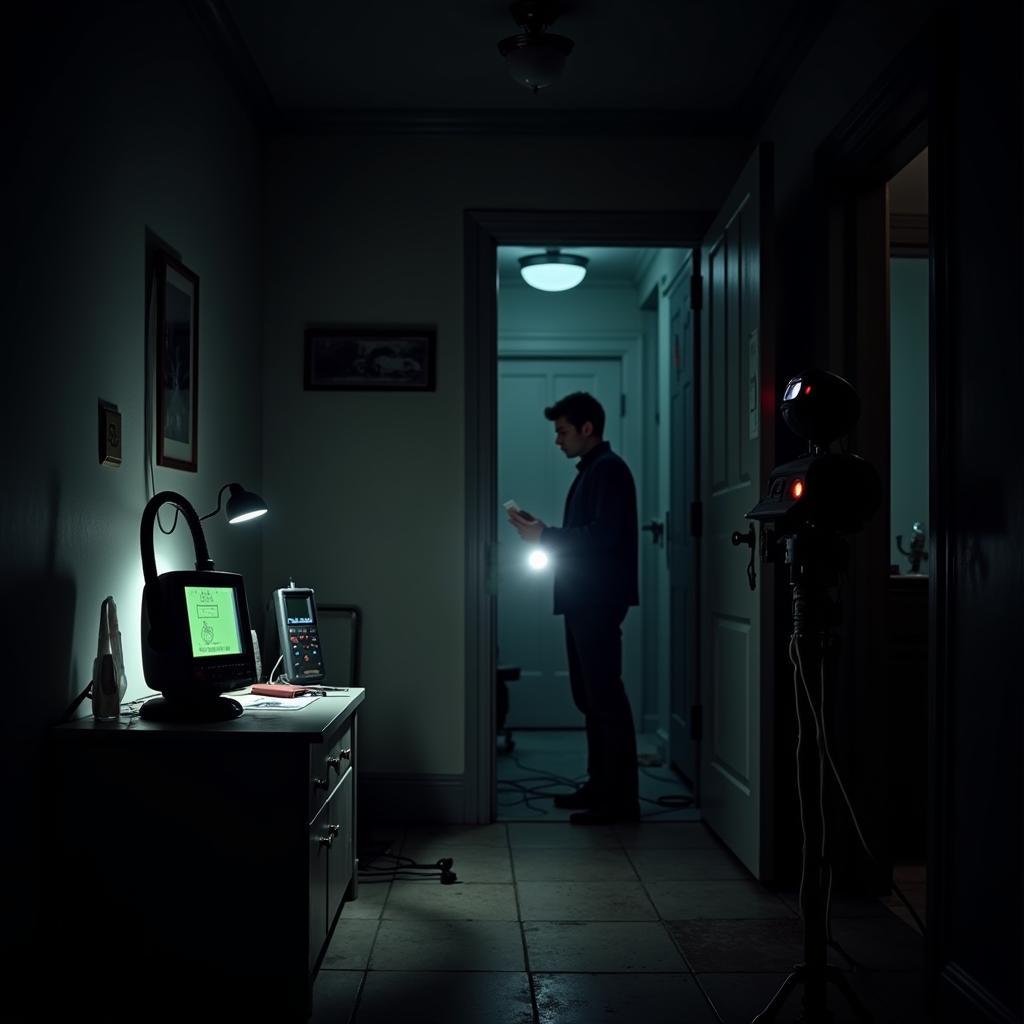The world of paranormal phenomena often leaves us with more questions than answers. How do we investigate something that seemingly defies the laws of nature? This exploration hinges on the interplay between Empirical Research Vs Theoretical Research, two crucial approaches that, while distinct, are ultimately intertwined in our quest to understand the unknown. empirical vs theoretical research
Diving into the Empirical: Hands-On Paranormal Investigation
Empirical research is the cornerstone of any scientific investigation, including those delving into the paranormal. It’s all about gathering tangible evidence through direct observation and experimentation. Think EVP recordings, thermal imaging, and meticulous documentation of environmental changes during paranormal investigations. This hands-on approach seeks to measure and quantify phenomena, offering concrete data that can be analyzed and scrutinized.
What Does Empirical Research Look Like in Paranormal Investigations?
Imagine a darkened, reportedly haunted house. An empirical researcher wouldn’t rely solely on stories and legends. Instead, they’d use EMF meters to detect electromagnetic fluctuations, set up infrared cameras to capture potential anomalies, and employ audio recorders to pick up unexplained sounds. This reliance on measurable data forms the core of empirical research.
 Empirical Paranormal Investigation
Empirical Paranormal Investigation
The Power of Theory: Building Frameworks for Understanding the Unknown
Theoretical research, on the other hand, focuses on developing conceptual frameworks and models to explain observed phenomena. In the context of paranormal research, theoretical research vs empirical research plays out in the development of hypotheses about the nature of ghosts, the possibility of psychic abilities, or the mechanics of otherworldly interactions. This often involves drawing upon existing scientific knowledge, philosophical concepts, and even cultural beliefs to construct plausible explanations.
Theoretical Frameworks in Paranormal Research
Consider the concept of residual hauntings. This theory suggests that certain events can leave an energetic imprint on a location, replaying like a broken record. This theoretical framework provides a potential explanation for reported phenomena like apparitions or unexplained sounds, guiding further empirical research by suggesting specific data points to look for.
Bridging the Gap: How Empirical and Theoretical Research Work Together
While seemingly different, theoretical research vs empirical research are fundamentally interconnected. Empirical research provides the raw data that informs and refines theoretical models, while theoretical frameworks guide the direction of empirical investigations, suggesting what to look for and how to interpret findings. This cyclical relationship is essential for advancing our understanding of any field, especially one as complex and elusive as the paranormal.
Dr. Evelyn Reed, a prominent parapsychologist, notes, “The strength of paranormal research lies in the synergistic relationship between empirical observation and theoretical interpretation. One cannot exist without the other.”
Can We Ever Truly “Prove” the Paranormal?
theoretical vs empirical research provide the foundation for any scientific investigation into the unknown. The pursuit to “prove” paranormal phenomena is a challenging endeavor. We can gather evidence and explore possible explanations, but reaching definitive proof remains difficult in light of the inherent complexities and elusive nature of these phenomena.
Conclusion: The Ongoing Quest for Understanding
The study of paranormal phenomena necessitates a balanced approach utilizing both empirical versus theoretical research. While empirical research provides the tangible evidence, theoretical frameworks help us make sense of it all. As we continue to explore the unknown, the interplay between these two approaches will be critical in unraveling the mysteries that lie beyond our current understanding.
FAQ:
- What is the main difference between empirical and theoretical research?
- How is empirical research conducted in paranormal investigations?
- What are some examples of theoretical frameworks in paranormal research?
- Why is it important to combine both empirical and theoretical approaches in studying the paranormal?
- What are some of the challenges in proving paranormal phenomena?
- How can I contribute to paranormal research?
- What are some reputable resources for learning more about Paranormal Research?
Need help with your own paranormal investigation or research project? Contact us! Phone: 0904826292, Email: research@gmail.com, or visit us at No. 31, Alley 142/7, P. Phú Viên, Bồ Đề, Long Biên, Hà Nội, Việt Nam. We have a 24/7 customer support team ready to assist you.